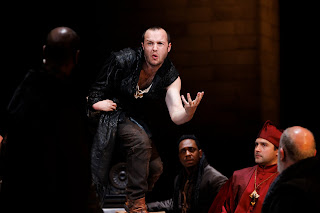When we last left Richard of Gloucester (Arthur Hughes,) he'd helped get his brother Edward IV (Ashley D Gayle) onto the throne, mainly by killing anyone who objected. He'd also taken centre stage for himself, wheedling his way into the audience's confidence with his plans to keep up the violence and plotting.
Not that anyone else on stage has noticed: Brimson Lewis' design centrepiece is a cenotaph, suggesting the victorious Yorkists think the Wars of the Roses are over, and all their victims tallied. But Edward is dying (unusually, for this family, of natural causes,) and Richard is the official protector of his young son and heir. He starts to mercilessly take out all obstacles to assuming the throne in his own right, starting with his brother Clarence (Ben Hall,) eventually making his way to the young princes themselves.
Much has of course been made of the most famous disabled character in theatre being played, for the first time in the RSC's history, by an actor with a real disability. Doran has even said the role should be out of bounds for able-bodied actors from now on like Othello is for white ones. It's a noble sentiment although one that would carry more weight if he was sticking around to take care of it himself: Since he's leaving the company it feels a bit like he's pre-emptively calling his successors dicks if they don't follow his example; I assume he's also taken a dump in Erica Whyman's desk drawer and sewn prawns into the curtains.
In any case, the most revelatory thing about casting an actor with a visible disability is that among the differently-shaped Dicks I've seen, here his shape matters the least: Where most actors put on a disability as part of their performance, Hughes deals with it in the same way he has all his life and in every part I've seen him play, so the only thing drawing attention to his body are the references in the text. More importantly than casting the right body for the part is casting the right actor, and Hughes continues the charm offensive from the previous play - he's not so arch as to be a panto villain, but Marvel supervillain might not be far off the mark. He sets the tone for a production where the comedy element is at the forefront, and his delivery of even familiar lines feels fresh and funny.
One reason he can keep the audience on-side through increasingly grisly crimes may be in a fairly subtle way: Richard tends to be portrayed with an edge of the sexual predator, most extremely in Ralph Fiennes' rapist Dick. Hughes goes the other way, and if not outright asexual, he's certainly more turned on by power than sex. It's highlighted in one of the best scenes, when Richard confronts his prospective mother-in-law (Kirsty Bushell.) An actress I've often seen give a fresh spin to familiar scenes, Bushell's Elizabeth inverts a trope I've seen in numerous productions, sealing the marriage deal by aggressively kissing Richard on the lips to his surprise and discomfort.
Elizabeth is among the play's small but memorable female roles, all served well here: Rosie Sheehy's Anne is perhaps seduced for real by Richard's emotionally abusive techniques; as his mother, Claire Benedict's Duchess of York's dislike for her son comes in a kind of exhausted resignation. And Minnie Gale concludes the arc of Margaret of Anjou, driven mad by the violence of the previous installments, now haunting the play like a horror movie demon, peering out from the hair completely covering her face.
The ranks of men named after counties, essentially just tools, obstacles, or both in turn to Richard, can really easily blend into each other. Jamie Wilkes and Matthew Duckett as his accomplices Buckingham and Catesby probably fare the best of of them.
Richard III by William Shakespeare is booking in repertory until the 8th of October at the Royal Shakespeare Theatre, Stratford-upon-Avon.
Running time: 3 hours 15 minutes including interval.
Photo credit: Ellie Kurttz.








No comments:
Post a Comment